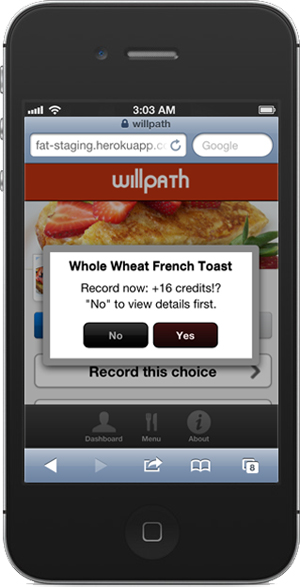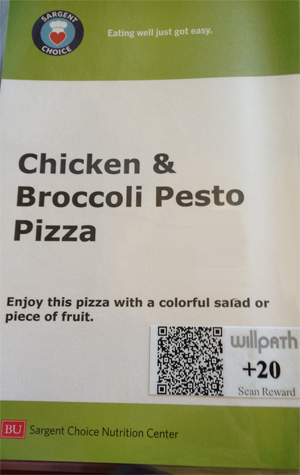Wealth from Willpath
BU start-up pays people to engage in healthy behavior

Parents have long known the motivating power of allowances in getting their children to perform chores. Now, a new company founded at BU confers that power on people other than parents in pursuit of a different task: keeping healthy. And so John Battaglino III (SHA’10) is paying his sister.
Anytime Anya Battaglino (CGS’12, CAS’14) eats a nutritious meal, exercises, or engages in healthy activity, she sends the information via a cell phone app to Willpath, a start-up online health company born as a BU research project. “It seems to really work to help motivate,” says Battaglino, who is sponsoring his sister. “It puts certain things like calories consumed and calories burned into realistic numbers people can understand. It helps people see how certain decisions affect their overall health immediately.” Anya Battaglino has earned $10 so far from her brother.
Willpower-with-a-wad is the strategy behind Willpath. Founded and run by Daniel Imler, a pediatric emergency medicine fellow at Boston Medical Center, the company began as a research project Imler did for his fellowship. A grant from BU’s Coulter Award Program, which supports joint research between clinicians and biomedical engineers, and another grant from Johnson & Johnson, helped him build the company during the last year. Willpath also works with Sargent College’s Sargent Choice program, which has stations in dining halls where students can scan in their healthy meals to alert Willpath.
The company plans to expand beyond its current coterie of BU students to attract other college, and even high school, joiners. Having mustered about 100 subscribers so far without marketing, Willpath is seeking other schools to partner with. Sponsors—parents, relatives, or friends of the students—buy a monthly subscription (staggered at $10, $50, and $200, “depending on how much a parent wants to encourage their child,” Imler says). Those accumulated fees create a kitty, and the student draws an allowance whenever she makes an agreed-upon healthy choice, from eating nutritious food to exercising.

“The recipient can also have multiple sponsors, so if Mom, Grandma, and an uncle all pitch in, the child could have a lot of incentive to be healthy,” says Imler. Willpath plans to make its profit by skimming a small percentage of each paying subscriber’s allowance. And if you don’t feel like shelling out the money and sponsoring anyone, Willpath lets you subscribe for free, touting the other benefits of joining an online community of health buffs—“for instance, competing against friends, competing as a team,” Imler suggests.
For now, healthy eaters at BU can scan in their meal choices via a mobile app Willpath developed, which can be found by typing willpath.com on any smartphone. For exercise, the company has deals with Nike and Fitbit to receive data from their pedometers and phone apps, and Imler says he’s negotiating more such deals.
While starting with BU students, subscriptions are open to anyone in the world, premised not just on profit, but the Net’s libertarian ethos. “You should be able to take your wellness system with you,” Imler says, “and share it with anyone you want.”

Comments & Discussion
Boston University moderates comments to facilitate an informed, substantive, civil conversation. Abusive, profane, self-promotional, misleading, incoherent or off-topic comments will be rejected. Moderators are staffed during regular business hours (EST) and can only accept comments written in English. Statistics or facts must include a citation or a link to the citation.